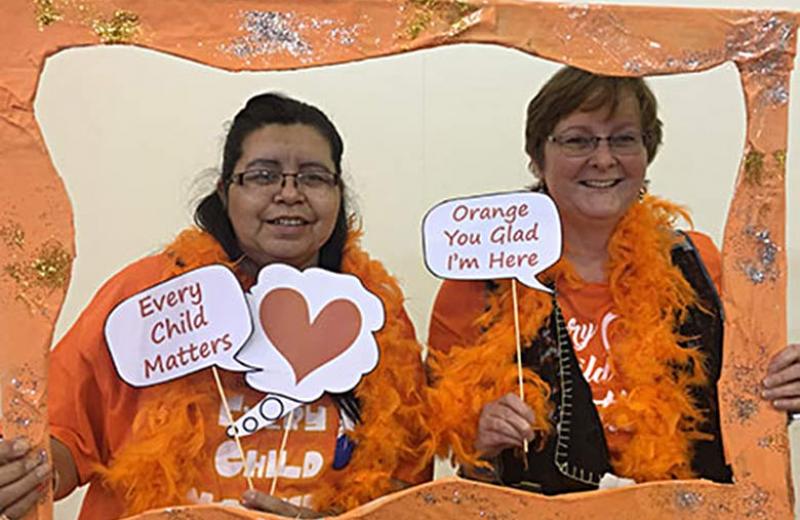I was honoured to be invited to Kitsumkalum's Orange Shirt Day by Charlene Webb, the community health director. Although I got to wear a beautiful locally designed orange shirt, enjoy yummy orange food, and visit with many people, this event has a sad undertone.
What is Orange Shirt Day?
September 29th is Orange Shirt Day – a day of remembrance and recognition of residential school survivors and those who did not survive.
It is a day each year to acknowledge the harm done by the residential school system to children's self-esteem and well-being and to remember that every child matters. Orange Shirt Day grew out of Phyllis' story. In 1973, when she was 6 years old, Phyllis attended the Mission school. On her first day of school, her clothes (including a special, brand new, shiny orange shirt) were taken from her and replaced with a uniform. Orange Shirt Day is an annual opportunity to engage in a discussion on all aspects of the residential school system.
Residential schools
September is when children go back to school and it is therefore timely to remember the Indigenous children in Canada who were taken from their families and travelled long distances to attend residential schools. Instead of being nurtured and supported, many suffered emotional, physical, and sexual abuse there.
Residential schools are a dark part of Canadian history that make me very sad. As a 6th generation Canadian white woman with First Nations children, I have struggled with this part of Canada's history. I first learned about residential schools when I was pregnant with my first child. I was devastated that such a thing could happen. As a parent, I cannot imagine a more heart wrenching and devastating experience than having my children forcibly removed and taken far away where I cannot protect them or care for them.
Learning more
As hard as it is, we need to acknowledge that this tragedy occurred and learn more about it so that it never happens again. I encourage you to explore several resources:
- Read the findings of the Truth and Reconciliation Commission (TRC). Over the course of six years, the Commission travelled to all parts of Canada documenting the truth of survivors, families, communities, and anyone personally affected by residential schools.
- The full TRC Report is extensive, but there is also an executive summary and a document summarizing the calls to action for Canada to redress the legacy of residential schools and move towards reconciliation.
- If you prefer, you can also watch and/or listen to the TRC Report! An independent project called "Read the TRC Report" has curated 140 videos of individuals reading sequential sections of the TRC Executive Summary. It's an extraordinary project.
- A follow-up project has provided standardized video and audio files for downloading to make it even easier for everyone to access this information.
Cultural humility
Part of healing from this difficult history in Canada involves all of us developing our cultural humility – our ability to be respectful, self-aware, and lifelong learners when it comes to the experiences of others.
I encourage you to join me and participate in the First Nations Health Authority social media campaign to engage all of us in advancing cultural safety and humility in the health system. In my daily life, I strive to do my part to help create an environment in Northern Health where people feel safe from racism and discrimination. Make a pledge today and share it on social media. Together we can make a difference.














Comments